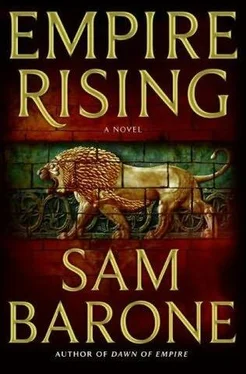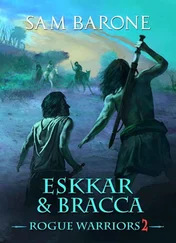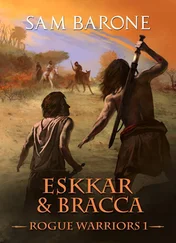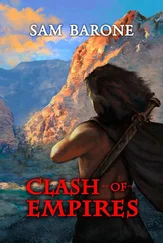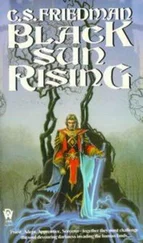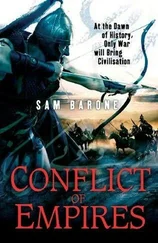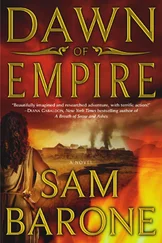Sam Barone - Empire Rising
Здесь есть возможность читать онлайн «Sam Barone - Empire Rising» весь текст электронной книги совершенно бесплатно (целиком полную версию без сокращений). В некоторых случаях можно слушать аудио, скачать через торрент в формате fb2 и присутствует краткое содержание. Жанр: Исторические приключения, на английском языке. Описание произведения, (предисловие) а так же отзывы посетителей доступны на портале библиотеки ЛибКат.
- Название:Empire Rising
- Автор:
- Жанр:
- Год:неизвестен
- ISBN:нет данных
- Рейтинг книги:4 / 5. Голосов: 1
-
Избранное:Добавить в избранное
- Отзывы:
-
Ваша оценка:
- 80
- 1
- 2
- 3
- 4
- 5
Empire Rising: краткое содержание, описание и аннотация
Предлагаем к чтению аннотацию, описание, краткое содержание или предисловие (зависит от того, что написал сам автор книги «Empire Rising»). Если вы не нашли необходимую информацию о книге — напишите в комментариях, мы постараемся отыскать её.
Empire Rising — читать онлайн бесплатно полную книгу (весь текст) целиком
Ниже представлен текст книги, разбитый по страницам. Система сохранения места последней прочитанной страницы, позволяет с удобством читать онлайн бесплатно книгу «Empire Rising», без необходимости каждый раз заново искать на чём Вы остановились. Поставьте закладку, и сможете в любой момент перейти на страницу, на которой закончили чтение.
Интервал:
Закладка:
“I am called Nisaba, noble one. As for these others, they are all afraid to speak to you, lest they be killed by the bandits when they return. They said they would come back as soon as you are gone.”
“But you’re not afraid, Nisaba?”
“They have already killed my two sons. My life is finished, and I am too old for their sport. The most they can do is kill me.”
“No one is going to kill you, Nisaba, I promise you that. You are under my protection now.”
He took her free hand and led her back to the well, the child following along, eyes wide and still holding fast to the old woman’s hand. “Sit down, elder.” He unslung his sword from his back, then joined her on the ground, sitting on the dirt in front of her and placing the scabbard flat across his knees. “Do you know who I am?”
She took her time answering him, as she gathered what was left of her ragged dress about her. “You are the Noble Eskkar, and, for now, the ruler of Orak.”
He couldn’t resist a smile at her use of the words “for now.” In the last few months he had often thought the same thing. “It is no longer called Orak, Nisaba. Now it is the City of Akkad.”
“Orak… Akkad… it makes no difference, noble one. It was called Orak when I was a child, and I see no need to change the names of things.”
Eskkar tugged at the thin beard on his chin. Trella had suggested the change of names, from Orak to Akkad, to help the people identify themselves with Eskkar and a new beginning. Eskkar had warned her that the switch might not be as smooth out in the countryside as within Akkad’s walls.
“Well, elder, we’ll talk more of that later. For now, you are the elder of the village of Dilgarth and you will speak for the village.” He lifted his eyes over her head to watch the reaction of the villagers. “Is there any other that thinks he should be the village elder?”
No one challenged his decision. “Nisaba, Dilgarth is under the protection of the City of Akkad, and all here will obey the laws of Akkad from now on.” Eskkar raised his voice, and addressed Dilgarth’s inhabitants.
“Akkad’s soldiers will soon clear the land of bandits, and you and your families will be safe in your shops and on your farms. The trade of flax and other goods will resume with Akkad, and, as before, you will be fairly paid for your goods. If you have complaints, bring them to your village elder,” he nodded toward Nisaba, “and she will present them to the soldiers stationed here or bring them to Akkad. If necessary, I will make the final decision. The customs of Akkad will apply to all equally, and Nisaba and the soldiers will see that they are enforced fairly.”
Eskkar felt glad to have that formality over with, though he doubted many understood what it really meant. Not that it mattered. Over the next few months, everyone in Dilgarth will soon appreciate the stability and security Akkad could provide. He returned his gaze to the new village elder.
“Now, tell me about the bandits that rode off when we arrived.”
The story came out slowly, as Eskkar’s commanders gathered close around their leader, anxious to hear the tale. The rest of the soldiers strained to hear Nisaba’s soft words, and for a long time the only other sound came from the occasional movement of one of the horses crowded together across the square.
Two months ago, the villagers began returning to Dilgarth after the barbarian migration had moved on, slipping back to their houses by ones and twos as they started to rebuild their homes and look to their crops and animals. They had rejoiced when they heard that the invaders had been defeated and driven off from Akkad, and even more farmers and craftsmen had returned.
But a little less than two weeks ago, while Eskkar and his men remained locked behind their walls, still afraid to venture forth until the barbarians moved out of striking distance from the city, a band of about twenty bandits had ridden into Dilgarth in the middle of the night, forcing the small fence and killing any who opposed them. By dawn, they had taken what women they wanted and looted the village.
Nisaba thought they might move on after a few days of pleasure, but these raiders seemed content to have the villagers gather and prepare food for them while they enjoyed their wives and daughters. The bandits remained in the village, a few now and then riding out on small raiding parties, looking to rob any farmers trying to work their lands or searching for any weak or isolated travelers on the road to Akkad.
The intruders had been cunning enough to kill any who attempted to escape to Akkad, and so only rumors had reached the city of their activity, though enough travelers had been robbed and attacked on the roads. The bandits had commandeered all the local food while the villagers went hungry. This morning, a little after dawn, a rider brought word of Eskkar’s approach. They had taken their time before riding off, insolently waiting until the soldiers from Akkad had been spotted less than a mile from the village.
When Nisaba finished, the crowd remained silent. Eskkar knew that everyone, soldiers and villagers alike, waited to see what he would do. Not two full days’ march from Akkad, and already he had a problem. Dilgarth was an insignificant place, a mere way station on the road to Akkad, and no one, soldier or villager, would be surprised if he left it and its misery behind. Eskkar had urgent business farther north, at Bisitun, and he could ill afford the time to scour the countryside looking for a small party of well-mounted and well-armed bandits, or to worry about the fate of a few pathetic villagers. Eventually, the bandits would leave the area when they had exhausted its food or tired of its women. Or when Eskkar established control of the land to the north. So in a matter of days or weeks, the problem here would be solved even if he did nothing.
Nevertheless, these villagers had now come under his protection. If Eskkar could not look after these wretched people by killing a few brigands, then his own authority would be little better than any bandit leader.
But as long as he stayed here, the bandits would not return, and he could not remain here long. Nor could he leave behind enough men to protect Dilgarth properly. He would need all of his soldiers in the north.
If he rode on, the bandits would return as soon as he had passed on. Without sufficient men, and even more important, without enough horses, he couldn’t chase after the bandits either. Besides, Eskkar didn’t know how many men they had, and he might soon find himself fighting a force equal to or greater than his twenty horsemen. So he had a problem with no easy solution, but one he needed to resolve, and quickly.
Eskkar looked at Nisaba, and he could almost see the same thoughts running through her mind. “Elder, I will think about this for a while. You and the others must eat. My men will share their food with you.” He looked at Sisuthros, seated a few steps away, making sure his second in command understood the request. “Then we will talk again, Nisaba.”
He stood up, and his men began to move. He heard Sisuthros give the orders to establish the camp, post the sentries, and feed the villagers.
Leaders of ten assigned sleeping places to their men while others saw to the pack animals. With all the activity underway, Eskkar entered the village’s largest dwelling, the home that the bandit leader had taken for his own headquarters.
Inside, Eskkar found the floor covered with discarded bones and shreds of cooked and raw fl esh scattered among broken pots and furniture. Flies buzzed about, feeding on the refuse. One corner had served as a casual latrine. Blood smears covered one wall and the dirt fl oor in the far corner was crusted red, either with wine or more blood. An odor of something rotten hung in the air, overpowering even the smell of urine.
Читать дальшеИнтервал:
Закладка:
Похожие книги на «Empire Rising»
Представляем Вашему вниманию похожие книги на «Empire Rising» списком для выбора. Мы отобрали схожую по названию и смыслу литературу в надежде предоставить читателям больше вариантов отыскать новые, интересные, ещё непрочитанные произведения.
Обсуждение, отзывы о книге «Empire Rising» и просто собственные мнения читателей. Оставьте ваши комментарии, напишите, что Вы думаете о произведении, его смысле или главных героях. Укажите что конкретно понравилось, а что нет, и почему Вы так считаете.
